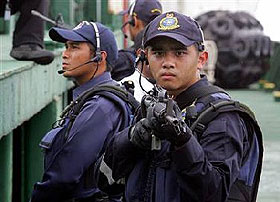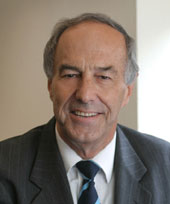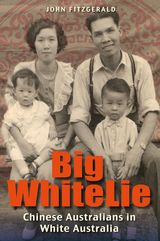Analysis
 |
ASIAN STUDIES AND THE AUSTRALIAN ELECTIONby Professor Adrian Vickers, University of Sydney adrian.vickers@usyd.edu.au |
| When I was asked to write on the topic of what the forthcoming election might mean for Asianists in Australia, the question that came to mind was: ‘How much difference will it make if Labor wins?’ For it is likely that if the Coalition is returned, we will have business as normal: the fostering of good relations with certain leaders, primarily in the name of the ‘War against Terror’, with the focus still on Indonesia, Singapore, the Philippines, Japan and India. In this respect the key difference in a Rudd government would be a policy outlook more sympathetic to China. Nevertheless, given that China is so economically important to Australia, the difference would not be felt strongly beyond nuances of foreign policy. If, however, Labor shifted the international priority away from Islam and terrorism, and towards global warming and the environment, issues such as the re-militarisation of Japan would automatically become less important than finding ways to work with China and India to reduce carbon emissions. Connections with Indonesia would shift towards the issue of deforestation and environmental destruction. I should stress that these are matters of emphasis, as Australia has already started to direct international programs in this direction. But for me as an Asianist, a Labor victory would provide the possibility that we Australians might actually come to be liked again in our region. Once, travelling as an Australian in the Asia-Pacific, I could be assured of a friendly reception. Even being in Indonesia during earlier ructions such as the Jenkins Affair back in 1986, I never felt that being an Australian was a disadvantage. People would speak to me of the importance of studying English via Radio Australia broadcasts, |
or their enjoyment of our television programs, or their experiences of having sight restored or getting clean water thanks to Australian aid. In more recent years I have been warned in Indonesia that I should say I am a New Zealander, have heard of Australian tourists being abused and told to ‘go home’ in the Philippines, and have seen the outcomes of Australian policies - such as the ‘Pre-emptive Strike’, the deaths of Indonesian fishermen in Australian custody, and the anti-Islamic rhetoric of Australian politicians - excoriated in Asian news media. Not all of these and other unpopular actions in Asia are directly attributable to the Howard Government, but the association has stuck. Only a change of government will shift these perceptions. A change of government alone is not enough to make up for all the damage done to Australia’s image in the region. The promises of a Rudd government to restore the promotion of Asian language teaching will be a positive step, as will the general image of Kevin Rudd as someone interested in Asia (and here we can contrast PM Howard’s specific statements against Asian immigration in the late 1980s, statements, |
I should add, he has since revoked). If we move away from a cultural focus on Britain and the US, we could see unexpected benefits, for example a better promotion of tourism to Australia in burgeoning markets such as China, rather than the culturally insensitive and British-focussed ‘Where the Bloody Hell Are You?’ The latter epitomises the cultural myopia of the Howard years, and says a lot about why Asianists do not receive a good hearing in Canberra. Management of the media will play a key role in changing attitudes about Australia in Asia, and of Asia in Australia, and there is much that is beyond the power of government in that area. However a government that is less ready to politicise aid and to play popularist domestic politics with foreign policy, will achieve much. Links
|

 |
PRIVATE SECURITY COMPANIES IN THE MALACCA STRAITS - THE NEED FOR REGULATIONby Carolin Liss, PhD Candidate, Murdoch University, c.liss@murdoch.edu.au |
| In the past few years, more and more private security companies (PSCs) have been conducting maritime security services in Southeast Asia. A focus for their operations in the region is the Malacca Straits, one of the busiest waterways in the world. More than 60,000 merchant vessels transit these narrow straits each year. Oil, gas and mineral resources are also found in the area, with both onshore and offshore energy installations in operation. Security in the Malacca Straits is an issue because politically motivated groups as well as criminal gangs are active in the vicinity. As the littoral states have not been able to address security threats in the Malacca Straits, ship- and cargo-owners, underwriters, and oil and gas companies have, in recent years, especially since September 11, hired PSCs to protect their assets, particularly from the threat of piracy, sabotage and terrorism. While many of the larger companies operating in the region are based in the USA and Great Britain, smaller ones have also been established in Southeast Asia. Many of these consist only of a limited permanent staff, an office and an impressive presence on the Internet, albeit with scant information abut their services and personnel. However, it does appear that the majority of PSCs operating in the maritime sector are founded and staffed by ex-military or ex-law enforcement personnel, with e additional staff and equipment procured on a case-by-case basis, once a contract is signed.
|
The role played by PSCs in the Malacca Straits area is twofold. First, their reports and risk assessments have increasing impact on decisions taken by governments and businesses, as well as on the formation of opinion in the public sector. Second, they provide guards and escort vessels for ships transiting the Malacca Straits, akin to the activities of military or local law enforcement agencies. PSC employees conducting this kind of work often carry firearms, making regulation and oversight of such their operations an important issue, but one that has yet to be adequately addressed. PSC employees from various companies have stated that they inform the Indonesian and/or Malaysian authorities abut planned operations, either through a liaison officer or a personal contact. In the process money changes hands and the company receives ‘permission’ to conduct its work. |
PSC employees from various companies have stated that they inform the Indonesian and/or Malaysian authorities about planned operations, either through a liaison officer or a personal contact. In the process money changes hands and the company receives ‘permission’ to conduct its work. These arrangements do not equate to proper permits. Regional governments should be introducing background checks on PSC personnel and procedures to monitor armed PSC operations. New regulations along these lines, and enforcement of these policies, would ensure that only reputable PSCs (with sufficiently trained personnel), are allowed to operate in the Malacca Straits. This would make the employment of PSCs a less risky business for all. Links:
|

Profile
|
This month we profile Professor John Hearn,
Deputy Vice-Chancellor (International) and Professor of Physiology at
the University of Sydney. |
||
|
Q: What are your current preoccupations? A major part of these activities is in Asia, especially in China, India, Indonesia, Japan, Korea, Vietnam and elsewhere. Our programs link the strength of partner universities in issues including health and ageing, rural and urban development, economics and employment, sustainable environment, agriculture and food, government and law, biodiversity and conservation. The University offers top quality degrees at the levels of undergraduate, coursework Masters, and research PhD. There are also executive leadership short courses for mid and later career leaders, through our Research Institute for Asia and the Pacific (RIAP). |
Q: How do these
fit into the contemporary scene? Q: What are your hopes for Asian Studies in
Australia? Links:
|
|

Student of the month
| Matt Eckersley (meckertime2@hotmail.com) started out life as a bit of a wanderer with a love of different cultures and new experiences. A serious illness while cycle touring in Asia forced a return to Australia and some heavy contemplation on future directions. After some serious thought Matt decided a career as a travelling doctor would be a good thing. In a stroke of luck he decided to undertake a degree in Indonesian studies, having baulked at the traditional Biomed degree. While other med students end up with seven years studying science, Matt has acquired another language and a wealth of great experiences from his undergrad degree. Studying Indonesia took Matt to Yogyakarta for a year, on the ACICIS program; then in 2005 he spent four weeks to Nias island off the coast of West Sumatra. There he saw the effects of the tsunami and earthquake that had struck earlier that year and the results of the following aid effort. |
In 2006 he spent two weeks in Yogyakarta after the earthquake there and now in 2007 he is off to Brunei for his six-week general surgery rotation. Next year in the final year of medicine he will complete an eight-week elective at Padang in West Sumatra, focusing on infectious diseases and emergency medicine. Although it meant studying harder than others in first year, Matt says that without a shadow of a doubt undertaking the degree in Indonesian was a great decision. Recently in a gala dinner to end a national medical students’ conference this was proven again. With 350 medical students and some prominent politicians in attendance an end-of-night trivia question was put out to find the greatest mind! The question began ‘Which Indonesian president…?’ Say no more for the glory was all Matt’s! ‘Greatest mind’ he definitely thinks not, but what a moment to put the icing on the cake of a degree in Asian studies as a gateway into medicine! |

Website of the month
|
The ASAA council has been working on a facelift for the ASAA website. There are links to 60 overseas Asian Studies associations, as well as links to Australian centres of Asian Studies. The website offers a searchable database on Asia expertise. See the new website at http://asaa.asn.au and enjoy yourself. |
Recent publication of interest
|
The author, Professor John Fitzgerald, head of the School of Social Sciences at La Trobe University has recently been appointed Chief Representative of the Ford Foundation in Beijing. He brings to the position extensive experience studying with Chinese scholars and working with researchers in China on projects ranging from the birth of Chinese nationalism to the origins of the party state, the historical development of China’s system of territorial administration, the experience of racism among the Chinese diaspora, and problems of human dignity and individual rights in contemporary East Asia. He will take up the position in January 2008. http://www.fordfound.org/global/office/index.cfm?office=Beijing
|

Did you know?
| From October 2007, trade
mark owners have the chance to register domain names in the new '.asia'
top-level domain (TLD), prior to a general release of .asia names in
2008. The domain space will open in several phases, offering opportunities
in turn to government entities, owners of marks currently in use, owners
of unused and newer marks, and the general public. Registration in the
.asia domain is a useful way to assert an association with the region
that extends beyond national borders. http://www.minterellison.com/public/connect/Internet/Home/Legal+Insights/News+Alerts/NA-Registration+of+asia+domain+names+opening+soon |

Diary dates
|
CINEMA INDIA: THE ART OF BOLLYWOOD, 6 June - 11 November, Sydney. Cinema India explores the phenomenon of Bollywood, primarily through film advertising materials - posters, hoardings, lobby cards and song books - from the 1930s to the present day. Alongside will be some dazzling Bollywood costumes as well as original film trailers and song and dance sequences featuring the most celebrated stars of Indian cinema. Wednesday 6 June - Sunday 11 November 2007 The Powerhouse Museum, 500 Harris Street, Ultimo, Sydney http://www.powerhousemuseum.com/exhibitions/cinema_india.asp KRISHNA - LOVE AND DEVOTION EXHIBITION, 6 October - 16 March, Melbourne. Krishna is one of the most popular of the Hindu gods worshipped throughout Asia and in particular India. The exhibition will explore Krishna iconography, through approximately 70 works including paintings, sculpture, textiles, photography, and jewellery. Asian Tempore Exhibition Space, Level 1, National Gallery Victoria International, 180 St Kilda Road www.ngv.vic.gov.au/krishna/index.html 11TH JAPAN FILM FESTIVAL, 29-31 October, Melbourne. This festival includes films about present-day Japan, the early Taisho period and Kyoto in the 1960s. This event is presented by the Japan Foundation in
corporation with the Consulate-General of Japan Melbourne. 6.30pm start
at ACMI Cinemas, Federation Square. Free. Tickets must be booked in
person at ACMI Box Office AUSTRALIAN -MALAYSIAN BILATERAL RELATIONS: A DIALOGUE, 30 October, Canberra. 2007 marks the 50th Anniversary Year of Malaysia’s Independence. To further our understanding of Malaysia and the ties between the two nations, the Malaysian High Commissioner, HE Dato’ Haji Salim Hashim, will be providing a ‘snapshot’ of Malaysia, after which the floor will be opened to questions from the audience. Australian Institute of International Affairs Conference Centre, Level 1, Stephen House, 32 Thesiger Court, Deakin. Please RSVP by 26 October to assist with catering arrangements. Email act.branch@aiia.asn.au or call 6232 4978. RADICAL ELEGANCE EXHIBITION, 1 November - 17 February, Perth. This is an exhibition of women's clothing by the renowned Japanese couturier Yohji Yamamoto, whose garments have been a significant influence on contemporary haute couture and prêt à porter clothes since his Paris debut in 1982. Art Gallery of Western Australia, Perth Cultural Centre, Perth. www.artgallery.wa.gov.au/exhibitions/Yamamoto.asp 2008 ASIALINK LEADERS PROGRAM, 8 November Melbourne;
15 November, Sydney. The 2008 Asialink Leaders Program is now
open for application. This program gives emerging leaders across all
sectors the skills to succeed across cultures and borders. Information
sessions will be held in both Melbourne and Sydney. For more information
see http://www.asialink.unimelb.edu.au/our_work/leaders INTERNATIONAL CONFERENCE ON CIVIL & MILITARY RELATIONSHIPS: IMPLICATIONS FOR THE HEALTH, MOBILITY AND WELLBEING OF CIVILIAN POPULATIONS IN ASIA-PACIFIC, 9 November, Melbourne. The conference will bring together eminent academics, researchers and practitioners from the region to focus on the complex issue of civil and military relationships in the contemporary era. It is targeted towards postgraduate students and early-career researchers. For more information contact Dr Tony Donaldson at tony.donaldson@adm.monash.edu.au. ASIA PACIFIC REGION: SOCIETIES IN TRANSFORMATION
conference, Georgetown (Penang) Malaysia, 19-22 November, 2007.
The region is seemingly now more integrated, with unprecedented levels
of tourism, migration, and economic and cultural linkages. But, are
the nations of the region and their populations, more divided, united
or are they fundamentally unchanged over the past two decades? These
are questions to be raised in a conference co-sponsored by the Universiti
Sains Malaysia (USM) and University of Wollongong. See: http://www.capstrans.edu.au/resources/conferences |
17th NEW ZEALAND ASIAN STUDIES SOCIETY (NZASIA) CONFERENCE, Otago, 22-25 November 2007. This will be an open, multidisciplinary conference. Full conference details can be found at http://www.nzasia.org.nz 'OCCUPYING 'THE OTHER': AUSTRALIA AND MILITARY OCCUPATIONS FROM JAPAN TO IRAQ'. 29-30 November 2007, Wollongong. This symposium sponsored by the Japan Foundation, the Centre for Asia Pacific Social Transformation Studies (CAPSTRANS) at the University of Wollongong and Monash University aims to bring together journalists, public commentators and scholars investigating Australian involvement in foreign military occupations. Contact Dr Christine de Matos cdm@uow.edu.au ASIA PACIFIC WEEK 2008: Building Australia’s Asia Pacific Expertise, 29 January - 1 February 2008, Canberra. During one week of activities graduate students from Australia and the region will have a chance to present their research interests, meet with other students and academics, participate in a wide range of training activities, be introduced to the rich holdings on Asia and the Pacific at the ANU Library and at the National Library and participate in a stimulating program of events including cross-area workshops, keynote speeches, seminars and master classes, film screenings, cultural performances and social events. See http://rspas.anu.edu.au/asiapacificweek THE COLD WAR IN ASIA: THE CULTURAL DIMENSION,
24-25 March 2008, Singapore. This conference will investigate
how Asian actors in the Cold War adhered to certain Cold War doctrines
or ideologies and how their cultural perceptions predisposed them towards
certain policies or to the political engagement between states and social
forces on the cultural front. Venue: Asia Research Institute, National
University of Singapore. http://www.ari.nus.edu.sg/events_categorydetails. CRITICAL HAN STUDIES SYMPOSIUM & WORKSHOP,
24-27 April 2008, Stanford University. Call for Papers. Han
is a colossal category of identity that encompasses ninety-four percent
of the population of mainland China, making it the largest ethnic group
on earth. Participants in the first-ever Critical Han Studies Symposium
& Workshop will help develop materials to be published in two path-breaking
volumes: Critical Han Studies, an edited volume, and the Critical Han
Studies Reader, a collection of primary source materials in translation.
The deadline for paper and panel proposals is 3 December 2007. For more
information contact Professor Thomas S. Mullaney at tsmullaney@stanford.edu
or James Leibold at Latrobe University: TRANSITION AND INTERCHANGE Ninth Women in Asia Conference, 29 September-1 October 2008, Brisbane. The University of Queensland is hosting the ninth Women in Asia (WIA) Conference, to be held from 29 September-1 October, 2008. Call for Papers: Contributions are invited from various disciplines on a large number of themes concerning the lives of women in Asia. Participants are encouraged to submit proposals for panels (with 3-4 papers per panel). Individual proposals are also welcome. Enquiries can be addressed to wia@uq.edu.au |

You are welcome to advertise Asia-related events in this space. Send details to: fbeddie@ozemail.com.au
Feedback
What would be useful for you? Human interest stories, profiles of successful graduates of Asian studies, more news about what's on, moderated discussions on topical issues? Send your ideas to fbeddie@ozemail.com.au.
About the ASAA
The Asian Studies Association of Australia (ASAA) promotes
the study of Asian languages, societies, cultures, and politics in Australia,
supports teaching and research in Asian studies and works towards an understanding
of Asia in the community at large. It publishes the Asian Studies Review
journal and holds a biennial conference. ASAA and the Centre for Language
Studies at National University of Singapore also co-publish an annual supplementary
issue of the Centre's fully peer-reviewed electronic Foreign Language Teaching
Journal (e-FLT). See http://e-flt.nus.edu.sg
The ASAA believes there is an urgent need to develop a strategy to preserve,
renew and extend Australian expertise about Asia. It has called on the government
to show national leadership in the promotion of Australia’s Asia knowledge
and skills. See Maximizing Australia's Asia Knowledge Repositioning and
Renewal of a National Asset http://coombs.anu.edu.au/SpecialProj/ASAA/asia-knowledge-book-v70.pdf
Asian Currents is published by the Asian Studies Association of Australia (ASAA) http://coombs.anu.edu.au/ASAA/ thanks to a grant from the International Centre of Excellence for Asia Pacific Studies (ICEAPS) http://iceaps.anu.edu.au. It is edited by Francesca Beddie. The editorial board consists of Robert Cribb, ASAA President, Michele Ford, ASAA Secretary, Mina Roces, ASAA Publications officer, Tamara Jacka, ASAA Council member, and Ann Kumar, Director, ICEAPS.



 Q:
When did you become interested in studying Asia and why?
Q:
When did you become interested in studying Asia and why?  http://asaa.asn.au
http://asaa.asn.au Big
White Lie: Chinese Australians in White Australia by John Fitzgerald,
UNSW Press, July 2007,
Big
White Lie: Chinese Australians in White Australia by John Fitzgerald,
UNSW Press, July 2007,